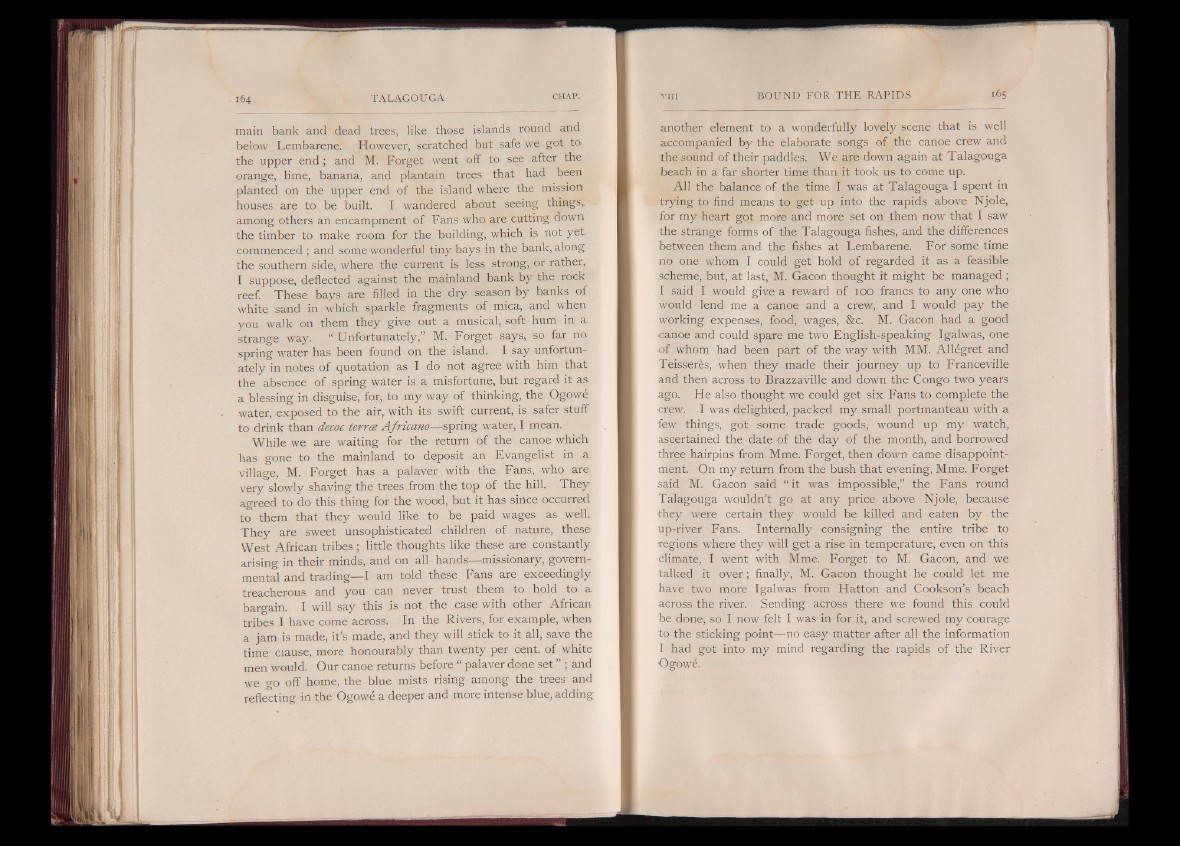
main bank and dead trees, like those islands round and
below Lembarene. However, scratched but safe we got to-
the upper end ; and M. Forget went off to see after the
orange, lime, banana, and plantain trees that had been
planted on the upper end of the island where the mission
houses are to be built. I wandered about seeing things,
among others an encampment of Fans who are cutting down
the timber to make room for the building, which is not yet
commenced ; and some wonderful tiny bays in the bank, along
the southern side, where the current is less strong, or rathei,
I suppose, deflected against the mainland bank by the rock
reef. These bays are filled in the dry season by banks o f
white sand in which sparkle fragments of mica, and when
you walk on them they give out a musical, soft hum in a
strange way. “ Unfortunately,” M. Forget says, so far no
spring water has been found on the island. I say unfortunately
in notes of quotation as I do not agree with him that
the absence of spring water is a misfortune, but regard it as
a blessing in disguise, for, to my way of thinking, the Ogow£
water, exposed to the air, with its swift current, is safer stuff
to drink than decoc terra Africano%spring water, I mean.
While we are waiting for the return of the canoe which
has gone to the mainland to deposit an Evangelist in a
village, M. Forget has a palaver with the Fans, who are
very slowly shaving the trees from the top of the hill. They
agreed to do this thing for the wood, but it has since occurred
to them that they would like to be paid wages as well.
They are sweet unsophisticated children of nature, these
West African tribes ; little thoughts like these are constantly
arising in their minds, and on all hands— missionary, governmental
and trading— I am told these Fans are exceedingly
treacherous and you can never trust them to hold to a
bargain. I will say this is not the case with other African
tribes I have come across. In the Rivers, for example, when
a jam is made, it’s made, and they will stick to it all, save the
time clause, more honourably than twenty per cent, of white
men would. Our canoe returns before § palaver done set ” ; and
we go off home, the blue mists rising among the trees and
reflecting in the Ogowe a deeper and more intense blue, adding
another element to a wonderfully lovely scene that is well
accompanied by the elaborate songs of the canoe crew and
the sound of their paddles. We are down again at Talagouga
beach in a far shorter time than it took us to come up.
All the balance of the time I was at Talagouga I spent in
trying to find means to get up into the rapids above Njole,
for my heart got more and more set on them now that I saw
the strange forms of the Talagouga fishes, and the differences
between them and the fishes at Lembarene. For some time
no one whom I could get hold of regarded it as a feasible
scheme, but, at last, M. Gacon thought it might be managed ;
I said I would give a reward of 100 francs to any one who
would lend me a canoe and a crew, and I would pay the
working expenses, food, wages, &c. M. Gacon had a good
canoe and could spare me two English-speaking I gal was, one
o f whom had been part of the way with MM. Allegret and
Teisseres, when they made their journey up to Franceville
and then across to Brazzaville and down the Congo two years
ago. He also thought we could get six Fans to complete the
crew. I was delighted, packed my small portmanteau with a
few things, got some trade goods, wound up my watch,
ascertained the date of the day of the month, and borrowed
three hairpins from Mme. Forget, then down came disappointment.
On my return from the bush that evening, Mme. Forget
said M. Gacon said “ it was impossible,” the Fans round
Talagouga wouldn’t go at any price above Njole, because
they were certain they would be killed and eaten by the
up-river Fans. Internally consigning the entire tribe to
regions where they will get a rise in temperature, even on this
climate, I went with Mme. Forget to M. Gacon, and we
talked it over; finally, M. Gacon thought he could let me
have two more Igalwas from Hatton and Cookson’s beach
across the river. Sending across there we found this could
be done, so I now felt I was in for it, and screwed my courage
to the sticking point— no easy matter after all the information
I had got into my mind regarding the rapids of the River
Ogowe.